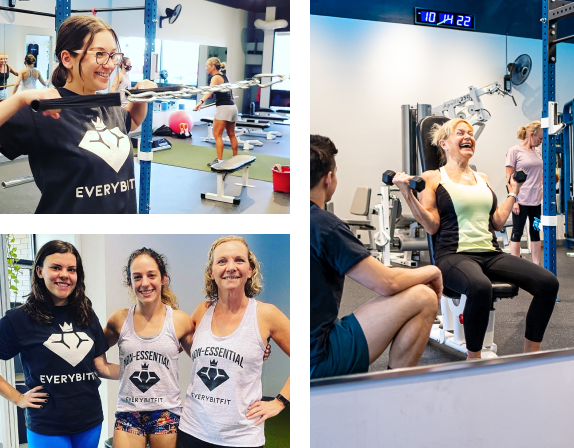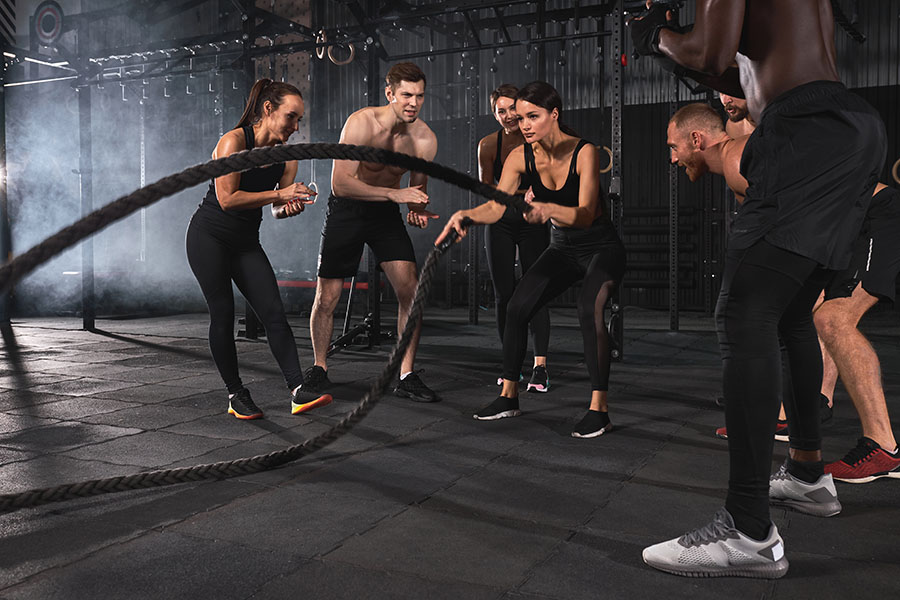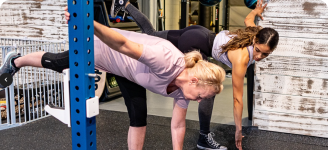Functional strength training is a type of training that focuses on improving your overall strength and functionality in everyday life. It involves performing exercises that mimic movements you would typically make in your daily activities. Unlike traditional strength training, which primarily focuses on building muscle mass, what is functional strength training aims to enhance your body’s ability to perform real-life movements efficiently without the risk of injury.
Benefits of functional strength training
Functional strength training has gained significant traction over the years as a holistic approach to fitness. It targets exercises that mimic everyday activities, thus enhancing strength, flexibility, and stability for daily tasks. When done under the guidance of an experienced personal trainer, especially in a specialized facility like EveryBitFit in Arizona, the benefits are extensive:
Real-world Applications: Functional strength training is rooted in movements we perform daily, like squatting, lifting, pushing, or pulling. Training at EveryBitFit ensures you’re better equipped for these real-world applications, reducing the risk of injuries in day-to-day activities.
Personalized Programs: The trainers at EveryBitFit understand that every individual is unique, with specific needs and goals. They curate personalized programs to ensure exercises are tailored for maximum effectiveness and safety.
Optimized Performance: Arizona’s rugged terrain and outdoor activities demand optimum physical conditions. Functional strength training boosts overall athletic performance, making activities like hiking, rock climbing, or even golf more enjoyable and less taxing on the body.

No Risk, All gain
Free Consultation & 30-Day Money Back Guarantee
Improved Balance and Posture: Functional exercises often engage the core and use multiple muscle groups simultaneously. This not only strengthens the core but also enhances balance, stability, and posture – vital for Arizona’s residents who might be navigating uneven terrains or participating in adventure sports.
Holistic Well-being: With the scorching Arizona sun and the state’s natural beauty as motivators, many residents prefer outdoor activities. Functional training, under the expert guidance of EveryBitFit trainers, ensures holistic well-being, allowing individuals to engage in these activities longer and more safely.
Education and Technique: An experienced personal trainer from EveryBitFit ensures you’re educated about each movement’s purpose. Proper technique is emphasized to maximize gains and minimize injury risks, especially in the challenging Arizona environment.
Motivation and Accountability: Training with a personal trainer keeps motivation levels high. The dedication and expertise of EveryBitFit trainers ensure that clients stay on track, pushing boundaries while maintaining safety.
Maximized Results in Shorter Time: With the expert guidance of a personal trainer, workouts are more efficient. Every session’s intensity and focus ensure that clients see faster, more sustainable results.
How does functional strength training differ from traditional strength training?
Comparison between functional strength training and traditional strength training
Functional strength training and traditional strength training have some key differences. Traditional strength training often involves exercises that isolate specific muscle groups, aiming to maximize hypertrophy and muscle mass. On the other hand, functional strength training focuses on training multiple muscle groups simultaneously, aiming to improve overall strength and functionality.
Differences in workout routines
The workout routines in functional strength training and traditional strength training also differ. While traditional strength training may primarily involve exercises using machines, free weights such as dumbbells and barbells are commonly used in functional strength training. Functional workouts often incorporate bodyweight exercises, functional movements, and equipment like kettlebells to improve overall stability and mobility.
Specific muscle groups targeted in functional strength training
Functional strength training targets a wide range of muscle groups, including those used in everyday movements. This includes muscles in the core, lower body, and upper body. Exercises like squats and lunges, which are common in functional strength training, engage multiple muscle groups simultaneously, making them effective for improving overall body strength and stability.
What are some of the popular functional strength training exercises?
Functional strength training focuses on movements that mirror real-world actions, enhancing your strength and efficiency for everyday tasks. Here are some common exercises, and how Zach O’Kane from EveryBitFit in Scottsdale might guide you through them:
1. Squats:
- Performance: Stand with feet shoulder-width apart, chest up, and eyes forward. Lower your body, pushing your hips back and bending your knees, keeping them aligned with your feet. Push through your heels to return to the starting position.
- Guidance from Zach: He would ensure your knees don’t bow inwards and that your back remains neutral, emphasizing depth to activate gluteal muscles.
2. Lunges:
- Performance: From a standing position, step one foot forward and lower your body until both knees are bent at a 90-degree angle. Push off the front foot to return to the starting position.
- Guidance from Zach: Zach would check your front knee alignment, ensuring it doesn’t extend past your toes, and confirm that your torso remains upright throughout the motion.
3. Push-ups:
- Performance: Begin in a plank position with hands slightly wider than shoulder-width. Lower your body, keeping elbows close to your sides, until your chest touches the ground, then push back up.
- Guidance from Zach: He’d ensure that your body remains in a straight line from head to heels, emphasizing core engagement and proper elbow positioning.
4. Deadlifts:
- Performance: Stand with feet hip-width apart, holding a barbell in front of you. Hinge at your hips and knees, lowering the barbell while keeping a straight back. Return to the starting position by driving through your heels.
- Guidance from Zach: Zach would focus on your hip hinge movement, ensuring the back remains neutral and the bar stays close to your body.
5. Plank:
- Performance: Begin in a forearm position with elbows below shoulders and legs extended straight. Keep a straight line from your head to your heels, engaging the core.
- Guidance from Zach: He would ensure proper alignment and might introduce variations, like side planks, to target different core muscles.
6. Rows:
- Performance: Holding a dumbbell in each hand, bend forward at the hips with a slight bend in the knees. Pull the weights towards your hips, squeezing the shoulder blades together.
- Guidance from Zach: Zach would emphasize the importance of retracting the shoulder blades and avoiding rounding the back.
7. Step-ups:
- Performance: Using a bench or platform, step one foot onto it and push through the heel to lift your body. Return to the starting position and switch legs.
- Guidance from Zach: He’d ensure your knee remains aligned with your foot and that you’re using your glutes and hamstrings to drive the movement.
With Zach O’Kane’s expert guidance at EveryBitFit, you’re not just going through the motions but learning the proper techniques, ensuring safety, and maximizing results. His experience ensures that each exercise is tailored to your fitness level and goals, ensuring a holistic and effective training regimen.
How can functional strength training benefit your health and fitness?
Functional strength training, under expert guidance, can significantly improve health, fitness, and overall well-being. When you train with a seasoned professional like Zach O’Kane at EveryBitFit, these benefits are amplified:
Improved Daily Functionality:
Functional training mimics everyday movements, enhancing your ability to perform daily tasks with ease. With Zach’s guidance, exercises are tailored to fit your specific lifestyle needs, ensuring you’re well-equipped for day-to-day physical demands.
Enhanced Core Strength:
Many functional exercises engage the core, which is pivotal for overall body strength and stability. Zach’s expertise ensures that these exercises are executed with proper form, maximizing core engagement and reducing the risk of injury.
Optimized Muscle Balance:
Functional training promotes balanced muscle development. Zach emphasizes compound movements that engage multiple muscle groups simultaneously, preventing imbalances that can lead to injury.
Increased Flexibility and Mobility:
Through dynamic functional movements, joint flexibility and mobility see marked improvement. Zach’s approach often integrates stretches and exercises that enhance the range of motion, benefiting overall functionality and reducing stiffness.
Boosted Calorie Burn and Metabolism:
Functional exercises are often compound in nature, engaging multiple muscle groups. Under Zach’s guidance, this ensures a higher calorie burn during workouts and increased muscle mass, which naturally boosts metabolism.
Reduced Risk of Injury:
Functional training, when correctly executed, enhances joint stability and muscle balance. With Zach’s watchful eye, exercises are performed with correct technique, minimizing strain and reducing the risk of injuries both in training and in daily activities.
Improved Posture and Alignment:
A strong core and balanced muscles, hallmarks of functional training, lead to better posture and spinal alignment. Zach’s guidance ensures exercises are tailored to correct any postural imbalances, contributing to better overall health and reduced back pain.
Enhanced Mind-Body Connection:
Functional exercises demand awareness and coordination. Zach’s training techniques foster a stronger mind-body connection, increasing mindfulness during workouts and daily activities.
Customized Workouts:
One of the standout benefits of training with Zach is the customization he brings to the table. Recognizing that everyone’s body and needs are different, he crafts functional workouts that are tailor-made for each individual, ensuring optimal results.
In essence, functional strength training, under the expert guidance of Zach O’Kane at EveryBitFit, provides a holistic approach to health and fitness. It’s not just about lifting weights or improving aesthetic appeal but about building a body that’s resilient, balanced, and primed for the demands of daily life.
What should you consider before starting functional strength training?
Considerations Before Starting Functional Strength Training with EveryBitFit (or Anywhere Else)
Before diving into functional strength training, whether it’s at EveryBitFit, without an experienced personal trainer or as you evaluate other trainers, several factors must be taken into consideration:
- Current Fitness Level: Recognize where you’re starting from. Beginners might need to start with basic exercises to avoid potential injuries and to build foundational strength.
- Understanding of Exercise Form: One of the primary benefits of having a personal trainer is their expertise in ensuring correct form. Incorrect form can lead to injuries. If you’re going solo, ensure you’ve educated yourself adequately on the proper techniques.
- Establish Clear Goals: Determine what you hope to achieve through functional strength training. Whether it’s improving daily functionality, boosting athletic performance, or rehabilitating from an injury, having a clear goal can guide your training approach.
- Equipment Availability: Some functional exercises require specific equipment like kettlebells, resistance bands, or stability balls. Ensure you have access to the necessary tools or can modify exercises accordingly.
- Training Space: Make sure you have a safe, spacious area to perform the exercises, especially those that involve dynamic movements.
- Consistency and Schedule: Determine how many days a week you can realistically dedicate to training. Consistency is key to seeing results.
- Potential Health Restrictions: If you have existing health issues or injuries, it’s crucial to know which exercises to avoid or modify. Always consult with a healthcare professional before beginning a new exercise regimen.
- Research and Education: Spend time researching functional exercises, watching tutorials, and reading about the principles behind functional strength training. Knowledge is power, especially when you’re guiding your own training.
- Evaluation of Other Trainers: If you’re considering trainers outside of EveryBitFit, research their credentials, client testimonials, training philosophies, and specialties to ensure they align with your needs.
Your journey to holistic fitness and robust functionality is a decision away. While self-training has its merits, nothing beats the personalized guidance of a seasoned professional. Contact EveryBitFit today for a free session, experience firsthand the difference expert guidance can make, and set yourself on a path to optimized health and fitness. Your best self awaits!






